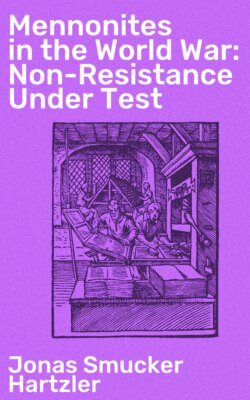Читать книгу Mennonites in the World War: Non-Resistance Under Test - Jonas Smucker Hartzler - Страница 27
На сайте Литреса книга снята с продажи.
Some Trials
ОглавлениеTable of Contents
The following from Hartzler and Kauffman's "Mennonite Church History" shows some of the trials which came upon this people:
"During the war many of the able-bodied Amish brethren of Berks County (Pa.), were drafted into service. Refusing to serve, they were imprisoned at Reading. bo many were thrown into prison that the women were com pelled to work in the -fields to support their families. Ac cording to tradition those who were imprisoned for refusing to do military service were sentenced to be shot, and the day was set for their execution. A meeting was held in the Reading prison to administer the Lord's supper to the con demned brethren. But the execution was never carried into effect. Through the leading of a kind Providence, friends in terfered (particularly Henry Hertzel, Pastor of the Re formed Church) who appealed to the authorities in behalf of those who had fled from Europe to escape mitiary service and who could not be expected to do what their conscience forbade them to do in their former country. The appeal was heard and the peace-loving prisoners were set free."[1]
Exemptions: Letter of Thanks
As early as 1775 the Pennsylvania Assembly passed a law exempting the Mennonites and Qua kers from military service under certain circum stances. The Mennonites wrote a letter of thanks to the Assembly and had a number of the bishops to sign it. The following are extracts from it:
"To the Honorable Assembly, In the first place we acknowledge us indebted to the most high God, who created heaven and earth, the only good Being for all His great goodness and manifold mercies and love through our Savior Jesus Christ."
"Further, we find ourselves indebted to be thankful to our late worthy Assembly for their giving so good an advice in these troublesome times to all ranks of people in Penn sylvania, particularly in allowing those who, by the doctrine of our Savior Jesus Christ are persuaded in their conscience to love their enemies and not to resist evil to enjoy the liberty of their conscience.
The advice to those who do not find freedom of conscience to take up arms, that hey ought to be helpful to those who are in need and distressed circumstances, we receive with cheerfulness towards all men of what station they may be it being our principle to feed the hungry and give the thirsty drink; we have dedicated ourselves to serve all men in everything that we can be helpful to the preservation of men's lives, but we find no freedom in giving or doing, or assisting in any thing by which men's lives are destroyed or hurt. We beg the patience of all those who believe we err in this point."
Records are still extant, giving the names with their respective amounts paid in money fines to be freed from military service on the above basis.
The war spirit ran high. Mob violence was not uncommon even in communities where the practices of the Church should have been well known. Government protests did little good as the parties who carried them on did them in the name of loyalty, not realizing that they were encouraging an archy instead of good citizenship.
